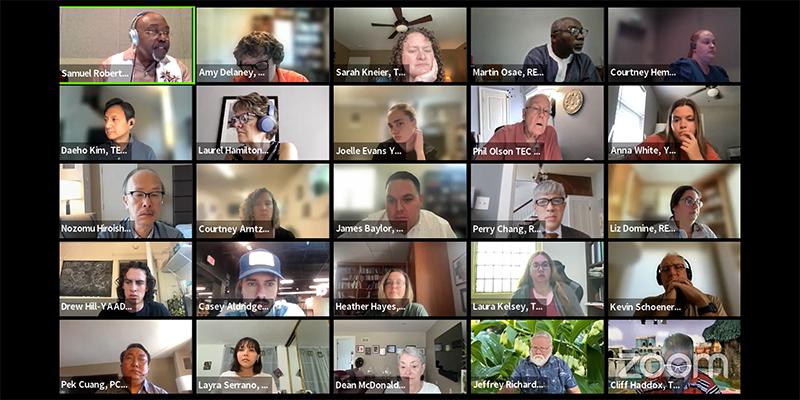
The Environmental and Climate Justice Committee continued its work on Wednesday June 26.

The Environmental and Climate Justice Committee continued its work on Wednesday June 26. Screenshot.
The Environmental and Climate Justice Committee voted overwhelmingly on Wednesday for the Presbyterian Church (U.S.A.) to divest from the fossil fuel industry to address the planet’s global climate crisis.
The committee voted 27 to 17 to approve ENV-02, an overture from the Presbytery of Susquehanna Valley that is intended to lead to “all publicly traded companies whose primary source of income is derived from the exploration, development, and production of fossil fuels” to be put on the Presbyterian Church (U.S.A.)’s list of prohibited securities.
Andrew Hill, a Young Adult Advisory Delegate from the Presbytery of Santa Fe, pushed strongly for ENV-02, leading the way for the successful vote after an earlier attempt by a fellow committee member to get a softer measure through failed.
Prior to the divestment vote, Hill read from a statement calling ENV-02 “the most impactful action our denomination can take to combat the detrimental impacts of the fossil fuel industry on the climate and to align our investments with our values.”
Hill also referenced ENV-06, a report from the Presbyterian Mission Agency’s Committee on Mission Responsibility Through Investment (MRTI) that sought, as originally filed, to continue the denomination’s longstanding practice of engaging with fossil fuel companies to try to get them to change their ways and to recommend selective divestment as a final straw. That process is inconsistent with “scientific consensus that deep, rapid and sustained mitigation efforts” are needed, Hill argued.
“We must respect the urgency of the science and the Earth we are called to be stewards of,” he said, then likened fossil fuel’s health effects to those of tobacco products.
“If we as a denomination can determine that smoke from products that individuals choose to consume are worthy of our divestment, then we must also do so for the smoke the fossil fuel industry pumps down the lungs of unconsenting peoples,” he said.
A public hearing before the vote attracted a long list of speakers in favor of divesting from the fossil fuel industry. Nearly a dozen speakers came forward to speak in favor of ENV-02 and were followed by another long list of overture advocates stressing the same desire.
Among those who spoke was Fred Milligan, a retired minister of Word and Sacrament, who authored ENV-02, and called on the church to take swift action against climate change.
“Our house is on fire; our world is burning,” said Milligan, an overture advocate from the Presbytery of the Highlands of New Jersey, one of several that concurred with ENV-02. “Millions of humans and other life forms are suffering and the window of opportunity for effective action to halt and reverse the planet’s plunge into climate chaos is rapidly closing. But there is hope if we act swiftly.” The approval of ENV-02 was a disappointment for MRTI.
“I really appreciate the passion and the thoughtfulness of the commissioners and the work, and I also admit that I'm really disappointed that the committee overlooked the meaningful work that MRTI has pursued through partnerships with other faith-based and values-driven partners, aiming to effect real change,” the Rev. Kerri Allen, MRTI chair, said after the meeting. “Unfortunately, what the committee did was opt for action that risks being merely performative and is unlikely to achieve meaningful result.”
During questioning by commissioners, Katie Carter, lead staff for MRTI, noted that ENV-02, if approved by the General Assembly, would tie MRTI’s hands when it comes to engaging with fossil fuel companies.
“While it will be up to investing agencies how they respond to ENV-02, it would end MRTI’s engagement process with all fossil fuel companies,” she said, adding, “We would no longer be able to engage with them and encourage them to improve their practices.”
The Rev. Dr. Thomas Taylor, president and chief executive officer of the Presbyterian Foundation, commented during the meeting that he’s not sure what would happen as a result of ENV-02 or ENV-06 (which was passed by the end of the meeting but in an amended form different from MRTI’s original proposal).
“There would still be a number of different regulatory bodies or statutes, or individuals like the state of Indiana’s Attorney General” that could have an effect, he said. “The church can decide what it wants on certain things, but we still have to abide by the jurisdiction of the civil jurisdictions of those arenas. And they may well say, ‘No, you can't do that.’”
After passing ENV-02, the committee voted to approve an amended version of ENV-06 by a vote of 30–13. It calls for prioritizing “responses to the urgent needs associated with the existential threats of the climate crisis, including those related to limiting global warming to well below two degrees Celsius, as outlined in the Paris Agreement.” It also calls for PC(USA)-related entities and members to promote and pursue comprehensive, faithful responses to such threats.
ENV-06 also calls for MRTI to continue engaging certain companies identified by Climate Action 100+ but that don’t primarily derive their income from the exploration, development and production of fossil fuels. MRTI would then report back to the 227th General Assembly (2026) with possible divestment recommendations.
The committee’s work continues on Thursday with business that includes a commissioners’ resolution.
